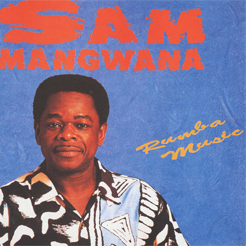|
 Mangwana, Sam, superb Congolese singer and song writer; born Kinshasa, Feb. 21, 1945. Mangwana, Sam, superb Congolese singer and song writer; born Kinshasa, Feb. 21, 1945.
Mangwana made his professional debut in 1963 with a brief turn at the mike behind Tabu Ley Rochereau in the Congo-Kinshasa rumba band African Fiesta. Almost immediately the wanderlust that would mark his career and earn him the epithet "pigeon voyageur" began to surface. He crossed the Congo River to Brazzaville where he formed a short-lived group called Los Batchichas and worked with the more established Negro Band and Orchestre Tembo. Back in Kinshasa he worked again behind Ley in African Fiesta National.
Mangwana emerged from Ley's shadow in 1967 as one of the leaders of an offshoot from African Fiesta National called Festival des Maquisards. Band included a number of excellent musicians—singer Ntesa Dalienst and guitarists Dizzy Mandjeku and "Michelino" Mavatiku Visi—who became mainstays of the Congolese music scene. Mangwana's "Zela Ngai Nasala" (wait while I work), about a workingman whose wife holds him to the standards of the rich, ranks among the band's best works.
In 1969 Mangwana split from the Maquisards along with guitarist Jean Paul "Guvano" Vangu. The two recorded occasionally as a duo until Mangwana caught on with O.K. Jazz, led by the formidable Franco, in 1972. As lead singer on compositions by O.K. Jazz guitarist Simaro Lutumba, Mangwana became a full-fledged star. The collaboration yielded three extraordinary hits: "Ebale ya Zaire" (River Zaire), about the loss of a loved one; "Cedou" (a woman's name), a rambling discussion of human relationships; and "Mabele" (the earth), a meditation on life and death.
Following a brief return to Tabu Ley's band, by then called Afrisa, Mangwana moved to Abidjan, Côte d'Ivoire. There, along with other expatriate (mostly Congolese) musicians, he formed the short-lived but influential African All Stars in 1978. Mangwana's songs of the man-done-in-by-woman genre like "Georgette Eckins" and "Suzana Coulibaly" were among the band's best sellers. When the All Stars broke up the following year, Mangwana became a solo artist, recording and touring with varying combinations of musicians. Maria Tebbo (1980) with remnants of the All Stars, Coopération (1982) with Franco, Canta Moçambique (1983) with Mandjeku, and albums with saxophonist Empompo Loway under the names Tiers Monde Coopération (third world cooperation) and Tiers Monde Révolution were highlights of Mangwana's output in the eighties. Standouts of the nineties included Rumba Music, Congolese rumba spiced with a touch of Latin salsa, Galo Negro, a haunting acoustic collection tinged with sounds from Mangwana's Angolan ancestry, and Sam Mangwana Sings Dino Vangu, a collaboration between two Afrisa alumni.
Given the decline of the Congolo-Paris recording business and the desperate conditions of Kinshasa, Mangwana began spending more and more time in his native Angola in the early 2000s. He emerged from time to time to perform concerts in Europe and reunited with Dizzy Mandjeku, a collaborator in African All Stars, for the CD Cantos de Esperança.
Mangwana ranks as one of Africa's best-known singers. Not a classic vocalist in the soaring style of Tabu Ley or Joseph Kabasele, Mangwana compensated with an impeccable delivery and a knack for innovation. The African All Stars speeded up the rumba's beat and helped give birth to the Paris-based sound called soukous. Galo Negro unplugged the guitars and slowed the rumba back down. Perhaps more importantly, Mangwana demonstrated that, in spite of intense criticism, one could follow one's own muse and still make a go of it.
© 2011 Gary Stewart
SELECT DISCOGRAPHY
Rumba Music (Stern's STCD9003) 1994; Maria Tebbo (Stern's STCD3011) late seventies recordings reissued 1995; Galo Negro (Putumayo PUTU140-2) 1998; Sam Mangwana Sings Dino Vangu (Stern's STCD1077) 2000; Cantos de Esperança (Next Music DCS9106) 2003.
With African Fiesta National: Rochereau, Sam Mangwana & L'African Fiesta National (Sonodisc CD36535) sixties recordings reissued 1993.
With Festival des Maquisards: Zela Ngai Nasala (Sonodisc CD36573) sixties recordings reissued 1997.
With O.K. Jazz: Franco, Simaro et le TP OK Jazz, (Sonodisc CD36520) seventies recordings reissued 1992; Franco & le T.P.O.K. Jazz, (Sonodisc CD36538) seventies recordings reissued 1993; Franco/Sam Mangwana, (Sonodisc CDS6860) eighties recordings reissued 1994.
With African All Stars: Gerogette Eckins (Sonodisc CDS7002) seventies recordings reissued 1996; Sam Mangwana et L'African All Stars (Ngoyarto SM010) eighties reunion recordings reissued 1996.
SELECT BIBLIOGRAPHY
M. Lonoh, Essai de commentaire sur la musique congolaise moderne (Kinshasa, 1969); C. Stapleton & C. May, African All-Stars (London, 1987); W. Bender, Sweet Mother (Chicago, 1991); G. Ewens, Congo Colossus (North Walsham, U.K., 1994); G. Stewart, Rumba on the River (London and New York, 2000).
|

